

* Blog & notes for last week.
DAYLOG MON 13 OCT 25 / SCOTUS TERM LIMITS: It has become painfully obvious that the US Supreme Court (SCOTUS) is remarkably indulgent to Donald Trump, often allowing Trump to get away with power grabs that seem outrageous to layfolk. Many critics are saying that Congress should pass legislation to reform SCOTUS. There's a lot of talk online about "court packing", meaning adding new judicial seats, but most legislation that has been presented instead envisions term limits of 18 years.
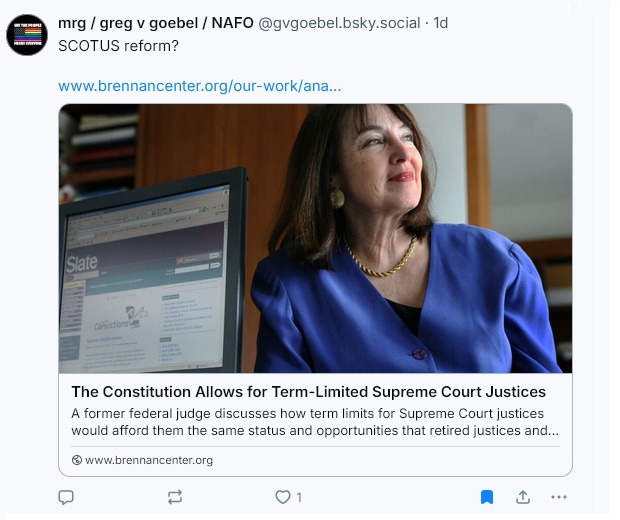
That would, as things stand now, get rid of the SCOTUS conservative majority. Retired Federal Judge Nancy Gerter, writing for the BRENNAN CENTER ("The Constitution Allows for Term-Limited Supreme Court Justices", 19 December 2024), explained that term limits are not a legally a troublesome idea, since supreme court term limits are normal in most other countries, and in fact normal in almost all US states -- and the majority of states also have mandatory retirement ages.
However, it is troublesome for SCOTUS in that the Constitution guarantees "lifetime tenure". The trick is that doesn't mean "lifetime tenure in a particular role." Lower Federal courts already allow judges nearing retirement to fully retire and collect the same pay via an annuity, or take on "senior status", with limited duties but the same pay. SCOTUS decided the "senior judge" scheme entirely constitutional about 90 years ago. Relative to SCOTUS, under schemes that have been pushed in Congress, SCOTUS justices at the term limit (or possibly retirement age, or both) could retire or take the "senior justice" option -- under which they would no longer have a vote along with the rest of the SCOTUS bench.
Many people after SCOTUS reform want some sort of "court packing" -- expanding the number of SCOTUS justices to eliminate the conservative majority. One problem with that is that Franklin Roosevelt tried court packing and was politically defeated. That appears to be why proposals in Congress have preferred to focus on term limits -- they're less risky, and no major departure from the current status quo. However, there's no point in saying there's only one solution: there are multiple solutions that will work, any one is fine.
DAYLOG TUE 14 OCT 25 / ZOHRAN MAMDANI'S FLEX: NYC mayoral hopeful Zohran Mamdani has been making waves, acquiring formidable political momentum ahead of the November election. As discussed in an article from THE NEW REPUBLIC ("Zohran Mamdani Is Threading One of the Trickiest Needles in Politics" by Perry Bacon, 26 September 2025), Mamdani is getting ahead not merely because he's smart, charismatic, and energetic -- but also because he's adopted a smart campaign strategy.
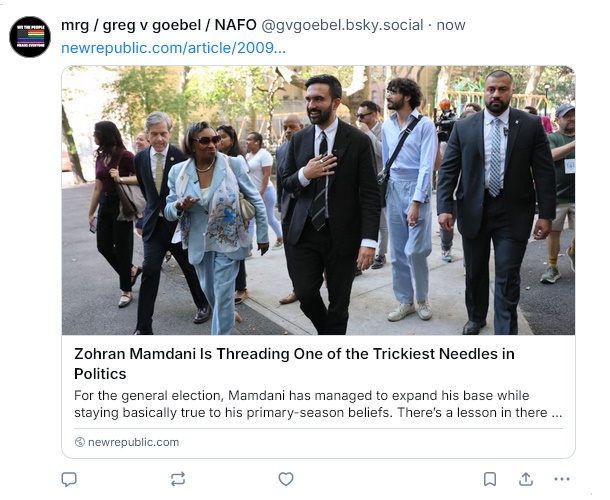
Mamdani won the primary for the NYC mayoral election by 44% of the vote -- putting him well ahead of rivals Eric Adams and Andrew Cuomo, but not giving him confidence that he could win the mayoral election itself. Mamdani had to broaden his voter base to win, not merely among voters, but among NYC's powerful backers -- the trick being that he had to do so without compromising his principles, Bacon writing:
QUOTE:
Mamdani is serious about stopping rent increases, expanding free childcare, creating city-owned grocery stores, eliminating fares for buses, starting a new department of community safety, and other proposals he made during the primary. He is less supportive of the Israeli government, the super-wealthy, and the police than many establishment Democrats. It was critical that he expand his coalition without changing his stances and turning into another unmemorable BLAH Democrat.
END_QUOTE
While Mamdani didn't hesitate to needle rivals Adams and (particularly) Cuomo, that was to be expected in a political race -- and Cuomo asked for trouble, his campaigning being awkward and annoying. Cuomo looks bad because made it easy. More importantly, while the hard Left has complained about established Democrat political figures such as Hakeem Jeffries not giving endorsements, Mamdani did not complain, accepting that they would be cautious, and quietly courted them -- getting some results.
Most significantly, Mamdani found out that moderate Democrat voters don't have much problem with his agenda, at least wanting to give him a chance with some of his more unconventional ideas -- though Mamdani has distanced himself from some hard-Left concepts, like "defund the police". That was a provocative slogan for ideas that weren't so controversial close up, and giving up the slogan did not mean giving up the ideas.
Of course, President Trump has, as expected, has targeted Mamdani with the usual threats and bluster. New Yorkers do not, as a rule, think highly of Trump, and so Mamdani has found the threats useful to his campaign. As a Muslim, Mamdani does have a challenge with NYC's Jewish community, but he's artfully managed to balance his criticisms of Israel -- even cautiously praising the Gaza cease-fire deal for which Trump is claiming credit.
In sum, Mamdani's successes might be a hint to the hard Left that moderate Democrats are not the enemy -- no, we're really not -- and that they are open to the hard Left message. However, Mamdani's election isn't in the bag just yet; we'll see what happens in November.
DAYLOG WED 15 OCT 25 / AI FAKE-OUTS: Everybody is aware that AI-generated articles are commonplace, but now a study by Graphite -- a search-engine optimization company -- says that about half of articles seen online are written by AIs.
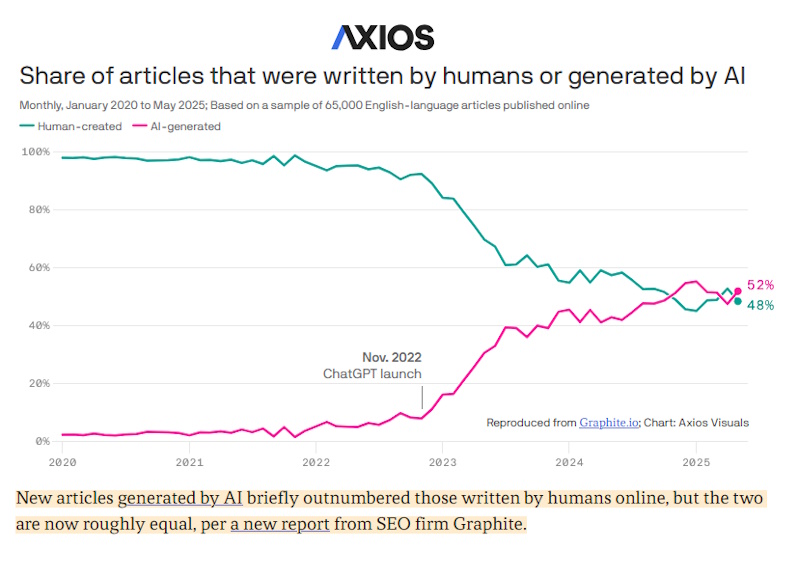
The proportion of AI-written articles increased rapidly over the past few years, but now has leveled off at rough par with human-written articles. Readers, however, often do disregard articles that look too machine-made.
AI-generated materials are noted for making mistakes, sometimes big ones. However, AI is often used to produce non-controversial materials, such as weather reports, earnings summaries, and product descriptions that are easily proof-checked.
There is also the reality that human writers often make use of AI in writing articles. An AI like Gemini is really just a search engine -- but it's a search engine that returns requested information, not links to documents with the information. A writer can then use the notes returned as a starting point and follow up to the articles the AI links to as crosschecks, as needed. Typically, for straightforward queries the AI gives straightforward answers -- and when the AI fails, the answer just doesn't look right. Anybody who can write at all well would never simply copy what comes out of an AI.
AI is a remarkable technology, but greatly overhyped. I was using an AI-based transcription tool to get text from audio in a video. It wasn't perfect, but no transcribers are; it did the job. I was playing with the NightCafe AI image generator for a time, but I finally had to give up. I just wanted simple illustrations as I needed them, but all I could get out of it was kitsch. I just found out Gemini can generate images, I'll see if that works better.
Of course, the idea of consulting an AI to deal with personal problems is completely mad. Gemini, when asked such questions -- or comparable dodgy questions -- just demurs and suggests seeking professional help. Is that so hard? It should be straightforward to fail-safe an AI.
And ... there is the problem of AI tech soaking up massive investments that can't pay off any time soon, leading to an economic bubble -- like the dot-com boom of the late 1990s, which led to a bust. We seem to be faced with an even bigger AI bust, but we'll see what happens.
DAYLOG THU 16 OCT 25 / PALMER RAIDS: To no really big surprise, the current US government obsession with deportations has its precedents, most notably the "Palmer Raids" of November 1919 and January 1920 -- which were part of the "First Red Scare".
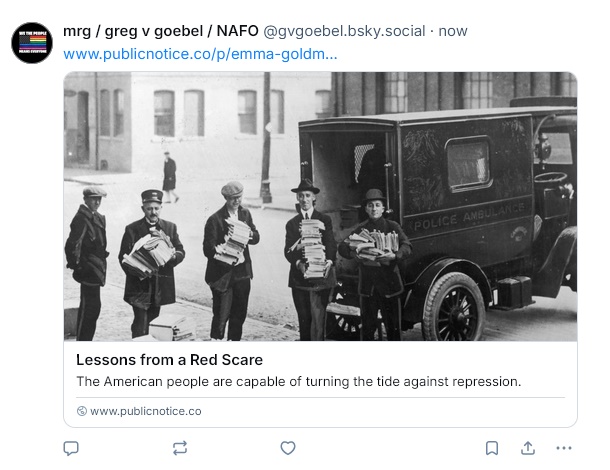
The emergence of communism in the 19th century did not go unnoticed in the USA, with paranoia about "Reds" spiking during Woodrow Wilson's presidency, particularly after the Bolshevik Revolution in 1917. Labor strikes raised tensions, with a number of anarchist bombings in the spring of 1919 pushing tensions to the snapping point.
US Attorney General A. Mitchell Palmer thought it was time to go after immigrant communists and anarchists, leading to a raid on an anarchist group in Buffalo, New York, in July. Since none of the people arrested in the raid had committed crimes, the courts let them go. Palmer went back to the drawing board to devise a stronger strategy, using tough immigration laws under the control of the Bureau of Labor.
A renewed effort was organized under J. Edgar Hoover, then a young official in the Department of Justice's Bureau of Investigation. In September, the Senate passed a resolution demanding that Palmer explain what he was doing about the "radical alien threat".
On 7 November 1919, the second anniversary of the Bolshevik Revolution, agents of the Bureau of Investigation, working with local police, conducted raids against the Union of Russian Workers in 12 cities. There were reports of beatings of detainees. In early January, a series of new raids began, ultimately covering more than 30 cities and towns in 23 states, but raids in Ohio and the West were largely symbolic in nature. The arrests tended towards the indiscriminate, with even Hoover admitting to cases of brutality.
The newspapers were generally enthusiastic about the raids, but there were critics. Changes in leadership at the Bureau of Labor led to more concern about due process, with the American public becoming disgusted at reports of police brutality as well.
The hysteria died down. Of about 10,000 arrested, there were only 556 deportations. The raids helped lead to the foundation of the American Civil Liberties Union (ACLU), which documented the excesses. Palmer ran for president in 1920, but didn't make it through the primaries, and the Republicans won the election anyway.
Today's ICE raids are making far more arrests and deportations, but public disgust is growing while support is declining. History does not repeat itself, but it does rhyme, and the ICE raids would seem to contain the seeds of their own defeat.
DAYLOG FRI 17 OCT 25 / CHINA DOES ROBOTS: As discussed in an article from FUTURISM ("Western Executives Shaken After Visiting China" by Victor Tangemarmann, 14 October 2025), Western company bosses visiting Chinese factories have found them crammed with robots. Andrew Forrest, CEO of Australian mining giant Fortescue, says: "There are no people. Everything is robotic. Other visitors report that sometimes factories don't even turn on the lights in normal operation, since the robots can work fine without them.
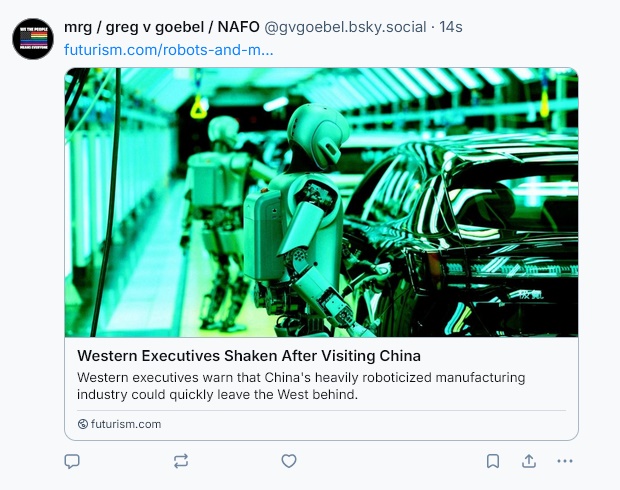
The push towards automation turns the stereotype of armies of low-wage Chinese laborers on its head, with factories relying much more on highly-skilled engineers who can design the robots and overall factory systems. Chinese state plans have promoted advanced technology development, with a particular focus on AI and robotics. Factory automation in China is being driven by the country's declining population, not profitability as such, as the workforce begins to shrink.
China is now setting up automated factories at a pace no other country in the world approaches. China has accordingly become a world leader in production of renewable energy systems and electric vehicles -- notably the Xiaomi EV. Ford CEO Jim Farley recognizes the threat, saying: "If we lose this, we do not have a future at Ford." That's rubbed in by the Xiaomi: "We flew one from Shanghai to Chicago, and I've been driving it for six months now, and I don't want to give it up."
Trump's push to "re-shore" manufacturing to the USA is, as it stands, a bust, since we don't have the workforce to compete with China as it was, and aren't pushing automation enough to compete with China as it is. "Everything Trump Touches Dies."
CRYPTOCOIN ATMS: I was a little surprised to learn about "cryptocoin ATMs", much like normal ATMs. There are tens of thousands of cryptocoin ATMs in the USA, often in convenience stores and the like, including about three here in the Loveland CO area.

They've been in the news lately because they have, to no great surprise, been scamming people of big piles of money -- sometimes due to steep markups on sales, sometimes due to failure to pay off when cryptocoin is sold. Law enforcement can't keep up.
Cryptocoin is dodgy to begin with, and it is hard to believe anyone would be so foolish as to pump any serious money into a cryptocoin ATM. I still retain some faith in humanity, because I'm surprised to find out people are that foolish -- though experience tells me I shouldn't be.
BACK_TO_TOP